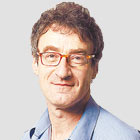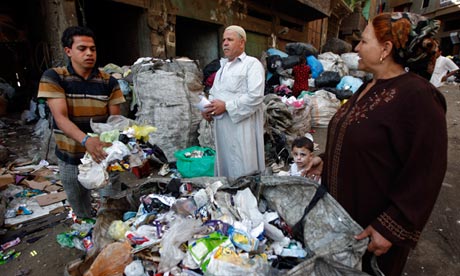Turnout is expected to be high in Wednesday's presidential election in Egypt, with voters keen to make history

Ian Black in Cairo
guardian.co.uk,

Election fever has even come to Cairo's Garbage City, the sprawling neigbourhood built on, and living from, the waste of the Egyptian capital. Photograph: Khalil Hamra/AP
Egypt has been through extraordinary times in the past 15 months, from the overthrow of Hosni Mubarak, through spasms of shocking violence and parliamentary elections that saw triumphant Islamists sweep the board. But Wednesday's presidential vote is that rare thing, a genuinely historic moment. It will be the first time, ever, that the Arab world's most populous country has chosen its leader without knowing in advance who the winner would be.
Campaigning ended 48 hours ago, but the so-called "electoral silence" is in fact a noisy cacophony of people enjoying free political debate and facing a genuine, if bewildering, choice. Over tea and nargileh pipes across the land, from dirt-poor villages to the glittering malls of the wealthy elite, Egyptians are discussing their vote.
"It's the first time I have bothered," admitted Ahmed al-Magour, an electrician from Shobra, one of the capital's poorest neighbourhoods, who earns about $250 (£160) a month moonlighting as a taxi driver to keep his wife and two children. "There was never any point voting before. Mubarak was the only candidate who mattered and you knew he was going to win."
Preparations appear thorough and turnout is expected to be high among the 50 million eligible voters. In Giza, army vehicles were out urging people to do their duty. Stern warnings have been issued about violence and fraud. Old suspicions die hard. According to one rumour, ballot papers have been "fixed" using invisible ink: citizens are advised to bring their own pens.
Of the 13 candidates vying to trigger the long-awaited transfer from military to civilian rule, five matter. Three of those – the former foreign minister Amr Moussa, the Muslim Brotherhood's Mohammed Morsi and the independent Islamist Abdel Moneim Abul Fotouh could, in theory, win outright – given the volatility of the polls and the sheer novelty of the situation.
Two others are contenders for a more likely runoff in mid-June: these are Mubarak's last prime minister, Ahmed Shafiq, and the independent leftist Hamdeen Sabahy, who invokes the tradition of Gamal Abdel Nasser and is closest to the revolutionary spirit that has faded since the heady days of last spring.
Moussa, still the frontrunner and chief "stability" candidate, is widely supported as a safe pair of hands. After decades of international diplomacy on behalf of Egypt and the Arab League he looks effortlessly presidential in dark suit and tie, surrounded by solicitous aides and guards.
"I am impressed by Moussa's profile," says Hisham Kassem, an influential publisher and editor, "though people have criticized me for saying so.
"He does have a clear programme and strikes you as someone who would be able to handle the presidency. We don't want idols and gods any more."
But, at 75, Moussa looks tired: he would be nearly 80 by the end of the one four-year term he has said he would serve. Critics say he is too centrist or too grey. In his TV debate against Abul Fotouh, he referred to himself in the third person, reinforcing a reputation for arrogance.
Moussa has worked hard to establish his revolutionary credentials – or at least to distance himself from Mubarak, always rumoured to be irritated by his foreign minister's popularity. Not all are convinced, despite a symbolic visit to Tahrir Square while his old boss was still in power. Still, his long and loyal service also allows Moussa to appeal to voters who backed Mubarak to the end.
Shafiq, like Mubarak an ex-air force commander, is, by contrast, an unapologetic opponent of the revolution who is openly anti-Islamist and scorned by opponents as a fuloul – a "remnant" of the old regime. Initially seen as an outsider, he has led in two recent polls and came a close second to Moussa in a third. Victory for him – unlikely but not impossible – could trigger serious unrest.
Still, both these "stability" candidates appear together in fresh graffiti on the battle-scarred walls around Tahrir – their viciously caricatured features added to those of Mubarak and Field Marshal Mohammed Hussein Tantawi, who heads the Supreme Council of the Armed Forces, Scaf, which is due to surrender power by 30 June.
Hostility towards the army is reflected in another drawing of a soldier with a skull in place of a head and carrying the scythe of the grim reaper. Just a few hundred metres away the armoured personnel carriers that guard the fortress-like US embassy are emblazoned with Scaf's counterpropaganda: the slogan "defence of the people" and posters showing a soldier cradling a young child.
Yet the signs are that the army will go back to barracks as promised next month as long as its vast economic interests and "red lines" on defence and foreign policy are respected. "They want to get out of politics," insists Kassem. "They hate it."
No one takes too seriously a scaremongering prediction by Mubarak's ex-spy chief Omar Suleiman of a military coup in the event of an Islamist victory. Many believe the generals would be happy with a win by the brotherhood, a familiar enemy. "Lines of communication are well-established," a foreign diplomat notes wryly. Abul Futouh, with a "big tent" appeal to liberals and fundamentalist Salafis, is more of a worry.
Revolutionaries acknowledge frustration at the length and limitations of the transition while speaking of a new sense of dignity and pride. "Under Mubarak we felt unimportant," mused a software engineer and Sabahy supporter, Yahya Ahmad. "Now we feel that we matter."
Some want to boycott the election on the grounds that there can be no free choice under military rule. Others are clear-eyed but optimistic. "It's a moment when you believe that we are turning a page," said the human rights activist Gassar Abdel-Razek.
"Egypt will not be the same as it has been, as we like to say, for 7,000 years. We are really choosing a president – but we will go out and demonstrate against him too. I feel great. I feel that my son will grow up in a better country."
No comments:
Post a Comment